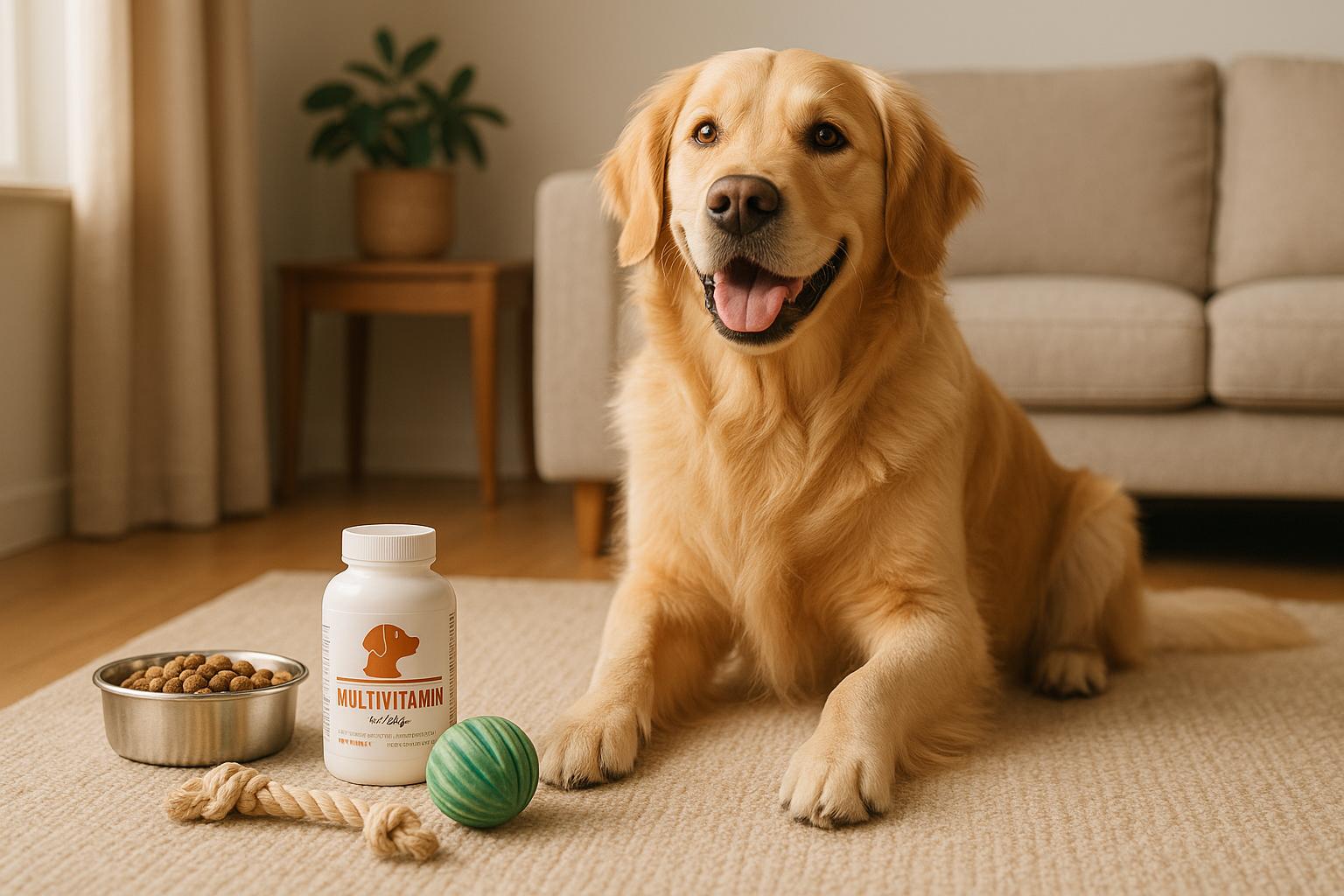
5 Signs Your Pet Needs a Multivitamin Supplement
Pets may not always get the nutrients they need from their diet alone. Here are 5 key signs that your furry friend might benefit from a multivitamin:
- Low Energy: If your pet seems tired, sleeps more, or lacks enthusiasm for play, they may need B vitamins or iron.
- Dull Coat or Skin Issues: Dry, flaky skin or excessive shedding could indicate a lack of omega-3s, biotin, or zinc.
- Digestive Problems: Changes in stool, appetite, or gas may point to poor nutrient absorption or enzyme deficiencies.
- Behavior Changes: Anxiety, lethargy, or social withdrawal might signal deficiencies in Vitamin D or magnesium.
- Joint Stiffness: Limping, reduced activity, or stiffness could mean they need glucosamine, chondroitin, or omega-3s.
Quick Overview:
- Multivitamins can fill nutritional gaps caused by aging, picky eating, or low-quality food.
- Always consult your vet before starting supplements to ensure they match your pet’s needs.
- Choose products with certifications like NASC or GMP for safety and quality.
Spotting these signs early can help your pet stay healthy, active, and happy longer.
5 Signs Your Pet Might Have A Nutrient Deficiency
1. Decreased Energy Levels
If your pet suddenly seems more tired than usual, it could be a sign of a nutrient deficiency. Spotting these changes early can help you address potential dietary issues.
Common Signs of Low Energy
Here are some noticeable signs that your pet may be experiencing a dip in energy:
- Sleeping more than usual or appearing constantly tired
- Less enthusiasm for play or physical activity
- Struggling to keep up during exercise
- Slower reactions to familiar commands
- Heavy breathing after minimal effort
"Excessive sleep, low energy, lack of excitement, and delayed responses are all overt signs of a lethargic dog" – Vetinfo
Nutrients That Support Energy
Certain nutrients, like B vitamins and iron, play a key role in keeping your pet active and full of life. These nutrients are essential for processes that affect energy levels and stamina.
Here’s a quick breakdown of what they do and what happens when they’re lacking:
| Nutrient | Role in Energy Production | Signs of Deficiency |
|---|---|---|
| Vitamin B12 | Supports nerve health and red blood cell production | Weakness, disinterest in play, confusion |
| Iron | Helps transport and store oxygen | Pale gums, difficulty breathing, faster heartbeat |
| B-Complex | Powers metabolism and energy production | Low activity levels, potential metabolic issues |
You might start noticing improvements in your pet’s energy within 6–8 weeks of adding these nutrients to their diet. For the best results, try giving the supplement in the morning with breakfast.
Real-Life Example: In November 2022, a 16-year-old dog named Yuki was diagnosed with pancreatic cancer, which caused her B12 levels to plummet. After starting B12 supplements, her energy levels improved significantly.
Next, let’s explore how nutrient deficiencies can impact your pet’s coat health.
2. Poor Coat Quality
Your pet’s coat can tell you a lot about their overall health. In fact, about 25% of dog visits to the vet are related to skin and coat issues. Spotting these problems early gives you the chance to address them with the right nutrition.
Nutrients That Support Skin and Coat Health
A healthy coat is shiny, smooth, and paired with skin that feels soft and clear. To maintain this, certain nutrients are essential:
| Nutrient | Role in Coat Health | Signs of Deficiency |
|---|---|---|
| Omega-3 Fatty Acids | Help reduce inflammation and improve coat shine | Dry, flaky skin; tangled fur |
| Biotin | Promotes healthy skin and fur | Excessive shedding; brittle hair |
| Vitamin E | Works as a natural moisturizer | Dry, irritated skin |
| Zinc | Aids in skin repair and regeneration | Patchy hair loss; slow healing |
How Supplements Can Help
If your pet’s coat isn’t looking its best, they might need extra nutritional support. Supplements with the right blend of nutrients can make a big difference. Look for options that include high-quality ingredients tailored to your pet’s needs.
"A nutritional deficiency can have a huge effect on a dog's skin and haircoat."
Here are some key nutrients to check for in a supplement:
- EPA and DHA (types of omega-3 fatty acids)
- B-complex vitamins
- Zinc and other minerals
- Biotin
- Vitamin E
In addition to supplements, regular grooming is just as important. Brushing your pet not only keeps their coat looking great but also helps distribute natural oils. Keep an eye out for sudden changes in their coat, like dryness, irritation, or excessive scratching. If you notice these signs, it’s a good idea to consult your veterinarian before introducing any new supplements.
Next, we’ll dive into other nutrition-related factors that can influence your pet’s overall well-being.
3. Stomach Problems
Digestive issues aren't just uncomfortable for pets - they can also signal a need for better nutrition. According to veterinary data, gastrointestinal problems account for about 10% of all vet visits.
Digestive Problem Signs
Watch for these warning signs of potential stomach troubles:
| Warning Sign | What It Indicates | When to Act |
|---|---|---|
| Stool Changes | Poor nutrient absorption | If changes last more than 48 hours |
| Appetite Changes | Disrupted eating patterns | If your pet stops eating for over 24 hours |
| Excessive Gas | Possible enzyme deficiency | Especially if accompanied by bloating or discomfort |
| Weight Changes | Problems with nutrient use | Unexplained changes over two weeks |
A 2017 study revealed that only 6% of wet pet foods and 38% of dry pet foods fully met nutritional standards. This gap in proper nutrition can lead to deficiencies, with 70% of dogs showing inadequate vitamin D levels, which impacts both digestion and nutrient absorption.
Digestive Health Supplements
Certain nutrients can significantly improve digestive health:
- B-complex vitamins: Support metabolism and enzyme activity.
- Probiotics: Help maintain a balanced gut microbiome.
- Digestive enzymes: Aid in breaking down food for better absorption.
- Fiber: Promotes healthy digestion and supports immune function.
"If we or our pets don't get these essential micronutrients that should be part of a complete and balanced diet, health issues could develop." – Dr. Jerry Klein, DVM, Chief Veterinarian for the American Kennel Club
When choosing supplements, look for the National Animal Supplement Council (NASC) quality seal, which ensures safety and proper absorption. Probiotics are particularly beneficial for pets recovering from antibiotics. Always monitor your pet's response to new supplements, and consult your veterinarian if issues persist.
sbb-itb-0a789c7
4. Changes in Behavior
Nutrient deficiencies don’t just impact energy levels and coat quality - they can also affect your pet's behavior. For instance, a lack of essential vitamins can lead to noticeable mood changes. Did you know that 75% of dogs are diagnosed with Vitamin D deficiency? This deficiency often shows up in various behavioral shifts.
Signs of Mood Changes
Here are some common behavioral changes that might signal a nutrient deficiency:
| Behavior Change | Possible Deficiency | Concern Trigger |
|---|---|---|
| Increased Anxiety | Vitamin D, Magnesium | Persistent nervousness lasting over 1 week |
| Unusual Lethargy | Vitamin D, Magnesium | Decreased activity for more than 48 hours |
| Social Withdrawal | Vitamin D | Avoiding usual interactions for several days |
| Restlessness | Magnesium | Inability to settle or relax |
Take Prince, for example - a 13-year-old dog who, in July 2024, started showing signs of anxiety and lethargy. After being diagnosed with a Vitamin D deficiency, his behavior improved significantly within just six days of supplementation.
Vitamins That Support Better Mood
Certain nutrients play a key role in keeping pets emotionally balanced and preventing behavioral issues:
- Vitamin D: This vitamin is vital for regulating mood and brain function. Surprisingly, around 40% of dogs have sub-optimal Vitamin D levels.
- Magnesium: Magnesium helps with nerve transmission and keeps the brain from becoming overstimulated, which can lead to anxiety.
- B-Complex Vitamins: These support the nervous system and promote emotional stability, particularly in aging pets.
Research backs this up. A 2018 study found that dogs with behavioral disorders benefited from supplementation. Those given magnesium citrate and zinc sulfate experienced significant improvements, including reduced fearfulness (P = .0083), less destructiveness (P = .002), and fewer incidents of inappropriate elimination (P < .001).
Providing these essential nutrients not only helps stabilize mood but also boosts overall vitality and well-being - another reason to consider a quality multivitamin for your pet.
5. Joint and Movement Issues
Just like energy levels, coat condition, and digestive health can highlight nutritional gaps, joint and movement problems often signal the need for added support. In the United States, joint issues affect about 20% of dogs over the age of one.
Movement Problem Signs
Here are some common signs that your dog may be dealing with joint-related challenges:
| Warning Sign | Description | When to Be Concerned |
|---|---|---|
| Mobility Changes | Limping, stiffness, or a "bunny hopping" gait | If these signs persist for more than 24 hours |
| Activity Reduction | Hesitation to climb stairs or engage in exercise | Noticeable changes in their daily routine |
| Physical Signs | Muscle loss in the thighs, compensatory shoulder build-up | Visible asymmetry in muscle tone |
| Behavioral Indicators | Irritability, excessive joint licking, or decreased appetite | Continuing for over 48 hours |
While occasional joint popping or cracking might not be a big deal, it could sometimes point to conditions like hip dysplasia. If these signs don’t resolve, adding joint supplements to your dog’s diet may help improve their mobility and overall comfort.
Joint Support Supplements
Research shows that dogs taking GlycoFlex® experienced a 41% improvement in hind-leg strength in just four weeks.
Here are some essential nutrients that promote joint health:
- Glucosamine: Helps with cartilage formation.
- Chondroitin: Supports cartilage structure and integrity.
- MSM (Methylsulfonylmethane): Contributes to better joint function.
"We recommend fish oil and Dasuquin as effective options that might help slow progression." - Dr. Joseph J. Wakshlag, professor of clinical nutrition and sports medicine and rehabilitation
"The supplement with the most support in the literature currently is omega-3 fatty acids from fish oil... a recommended daily dose of 1 teaspoon per 20 pounds of ideal dog weight is recommended." - Dr. Christopher Frye, assistant clinical professor and section chief of sports medicine and rehabilitation
For quality assurance, look for joint supplements with the National Animal Supplement Council (NASC) seal. Many trusted products combine multiple joint-supporting ingredients. For example, Nutramax Dasuquin Hip & Joint Soft Chews have earned a 4.7 out of 5-star rating from over 8,000 reviews, reflecting strong consumer satisfaction.
Picking a Pet Multivitamin
Once you've identified signs that your pet might benefit from supplements, the next step is selecting a product tailored to their unique nutritional needs. Pets require different nutrients depending on their life stage, and as veterinary experts emphasize, there's no "one-size-fits-all" solution when it comes to supplements.
Must-Have Nutrients
Here’s a quick breakdown of essential nutrients every pet multivitamin should include:
| Nutrient Category | Components | Benefits |
|---|---|---|
| Vitamins | A, B-complex, D, E | Strengthen immunity, boost energy, and support bone health |
| Minerals | Calcium, Zinc, Iron | Promote skeletal and cellular health |
| Digestive Support | Probiotics, Enzymes | Aid in nutrient absorption |
| Fatty Acids | Omega-3, Omega-6 | Improve skin health and joint function |
After reviewing the nutrient content, make sure the product meets strict quality and safety standards.
Safety and Quality Checks
When choosing a pet multivitamin, safety and quality should always come first. Studies reveal that supplement quality can vary widely; for instance, one study found chondroitin sulfate levels in pet supplements ranged from just 22.5% to as high as 155.7% of what was stated on the label.
To ensure you're getting a reliable product, look for certifications like the NASC Quality Seal, GMP, or cGMP, which guarantee purity and adherence to stringent quality control measures.
"I think healthy dogs that eat a high-quality balanced diet do not necessarily need any supplements." - Dr. Kathy Baker, Lucy's Veterinary Care
When selecting a multivitamin, consider these factors:
- Age-Specific Formulation: Ensure the product is designed for your pet's life stage.
- Health Needs: Match the supplement to any specific health concerns.
- Ingredient Transparency: Opt for products with clear and honest labeling.
- Certifications: Look for GMP and cGMP seals to confirm quality.
With the pet supplement market reaching $580 million in sales by 2016, it’s clear that many pet owners are investing in their pets' health. However, always verify third-party testing and steer clear of products with exaggerated claims. A little research goes a long way in keeping your pet healthy and safe.
Conclusion: Using Multivitamins for Pet Health
Spotting signs of nutritional gaps plays a crucial role in keeping your pet healthy. While a well-rounded diet usually provides the nutrients they need, there are times when supplementation might be necessary.
Changes in your pet's coat, energy levels, or digestion can often hint at nutritional deficiencies that need attention. These early signs shouldn’t be ignored.
"Most healthy dogs get the vitamins they need from complete and balanced dog food." - Dr. Sarah J. Wooten
If symptoms persist, here’s what you should do:
- Consult your veterinarian to rule out any underlying health issues.
- Follow professional advice when selecting supplements that align with your pet's age and specific health needs.
For example, senior pets might benefit from supplements that support joint health and cognitive function, while active younger pets could need extra nutrients for energy and muscle recovery. These considerations, as discussed earlier, can help you make informed decisions about supplementation.
"Don't forego traditional therapies, especially if it's a life- or organ-threatening illness for your pet... Make sure you stick with a standard of care and use the supplements as they were intended, as supplements." - Dawn M. Boothe, DVM, MS, PhD, director of the clinical pharmacology lab at the Auburn University College of Veterinary Medicine
When introducing a new supplement, it’s a good idea to start with half the recommended dose and watch for any changes in your pet’s behavior or health - whether positive or negative. This cautious approach helps you get the most out of the supplement while minimizing risks.
FAQs
How can I tell if my pet's low energy is caused by a nutrient deficiency or another health problem?
If your pet seems more tired than usual or is acting sluggish, it might be a sign of a nutrient deficiency or another health concern. A good starting point is to look at their diet. Low levels of protein, essential fatty acids, or vitamins can lead to symptoms like low energy, a dull coat, or even dry, flaky skin. These deficiencies might also slow down healing or cause noticeable changes in their appetite.
But diet isn’t always the culprit. Low energy could also be tied to issues like parasites, thyroid disorders, or chronic conditions such as diabetes. If your pet’s energy levels stay low even with a well-rounded diet, or if you notice other unusual symptoms, it’s time to reach out to your veterinarian. A detailed check-up can uncover the cause and help your pet get back to feeling their best.
What certifications should I check for when picking a high-quality multivitamin for my pet?
When choosing a multivitamin for your pet, it’s important to focus on certifications that highlight quality and safety. One to look for is the NASC Quality Seal, which signifies the product adheres to the strict guidelines of the National Animal Supplement Council. Another is GMP Certification (Good Manufacturing Practices), ensuring the supplement is made under rigorous safety and quality standards. Also, check for supplements that have undergone third-party testing to verify ingredient accuracy and purity. These certifications provide peace of mind that the supplement is both safe and effective for your pet.
How soon can I expect to see improvements in my pet's health after starting a multivitamin?
You might see changes in your pet's health at different times, depending on what you're focusing on. If you're looking for more energy and a better appetite, these improvements usually appear within 2–3 weeks. For a shinier coat and less shedding, give it around 3–4 weeks. Improved mobility typically takes about 4–6 weeks, while noticeable boosts in overall vitality may require 6–8 weeks. Keep in mind, every pet is different, so the timeline can vary based on their health and specific needs.





